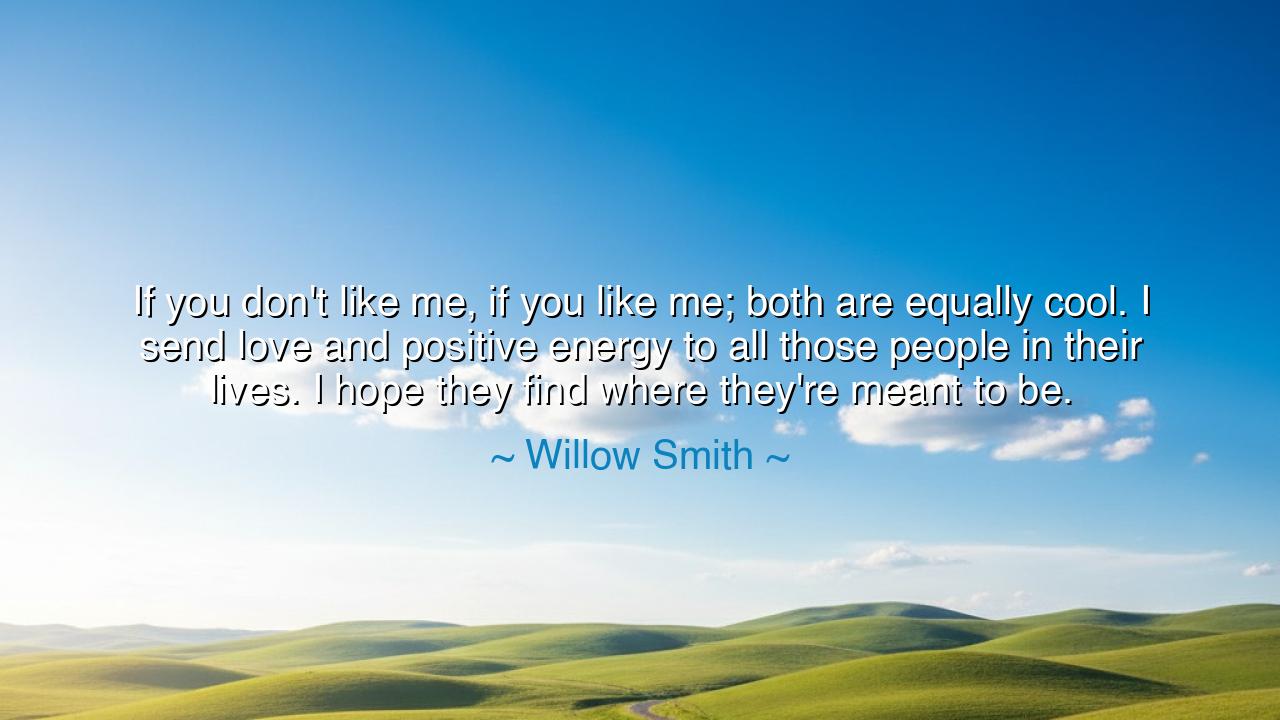
If you don't like me, if you like me; both are equally cool. I
If you don't like me, if you like me; both are equally cool. I send love and positive energy to all those people in their lives. I hope they find where they're meant to be.






When Willow Smith spoke the words, “If you don’t like me, if you like me; both are equally cool. I send love and positive energy to all those people in their lives. I hope they find where they’re meant to be,” she offered a profound teaching on the nature of acceptance, love, and non-attachment. In a world where judgment and division often define our relationships, Willow's sentiment is a call to embrace others, regardless of whether they accept us in return. She recognizes that our worth does not depend on others’ opinions, but rather on our ability to send love and positive energy, regardless of how others may feel about us.
The ancients understood that the path to peace and wisdom lay in non-attachment to external validation. Buddha, in his teachings on detachment, advised that we should not become overly concerned with the opinions or judgments of others. Buddha taught that our true nature lies within us, and when we attach ourselves to the approval or disapproval of others, we lose sight of our inner peace. Just as Willow Smith declares that whether people like her or not is irrelevant to her, the Buddha urged his followers to maintain equanimity in the face of praise or criticism, for the mind that is attached to external judgments is a mind that is not free.
Similarly, Socrates, the ancient Greek philosopher, lived his life guided by a similar principle. Socrates’ commitment to his ideals and pursuit of knowledge was unshaken by the opinions of others. When brought to trial and condemned to death, Socrates did not beg for mercy nor attempt to change the minds of those who judged him. Instead, he faced his death with calm and dignity, maintaining that the truth was his guiding force. Like Willow, Socrates remained steadfast in his self-knowledge, not swayed by the changing tides of public opinion. His story teaches us that external approval is fleeting, while inner conviction is what sustains us.
The example of Nelson Mandela further reinforces this idea. During his imprisonment for 27 years, Mandela was subjected to countless acts of hatred, misunderstanding, and rejection by those who opposed him. Yet, throughout his time in prison and upon his release, Mandela maintained a stance of love and forgiveness. He famously said, “I am not a saint, unless you think of a saint as a sinner who keeps on trying.” His ability to send love and positive energy to those who rejected him was a powerful force in his ability to heal a fractured nation. Like Willow Smith, Mandela understood that love transcends hate, and that true strength comes from within, not from the approval of others.
This philosophy of non-attachment is not only a path to inner peace, but also a way to free ourselves from the weight of judgment. Jesus Christ, in his teachings, spoke often of the importance of loving both friends and enemies. He taught his followers to send love to those who persecuted them and to forgive those who wronged them. This notion of unconditional love—the ability to send goodwill even in the face of rejection or hatred—has been a cornerstone of many spiritual traditions. Jesus, like Willow, acknowledged that our response to others is within our control, and love is the most powerful force we can wield.
The lesson of Willow Smith’s words is simple yet profound: we cannot control how others perceive us. There will always be those who approve of us and those who do not, and both are equally valid parts of the human experience. Acceptance of others, regardless of their feelings toward us, frees us from the prison of self-doubt and insecurities. Like the ancients, Willow teaches us that true peace comes when we stop seeking validation from others and instead, offer love freely, without expectation of return.
In your own life, practice this wisdom. Let go of the desire for approval or the fear of rejection. Whether others accept you or not, focus instead on sending love, positive energy, and goodwill to those around you. Recognize that your worth is not contingent on others’ opinions, but on your ability to remain true to your heart and purpose. When you send love into the world without expecting anything in return, you become a force for good, and in doing so, you free yourself from the shackles of judgment, finding peace in the present moment. Let Willow Smith’s wisdom guide you: love is not earned by approval; it is freely given, and it is through love that we find our true strength.






AAdministratorAdministrator
Welcome, honored guests. Please leave a comment, we will respond soon